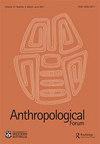记录卡斯顿:阿尔弗雷德·哈登在托雷斯海峡和新几内亚的日志,1888年和1898年
IF 0.7
3区 社会学
Q3 ANTHROPOLOGY
引用次数: 3
摘要
一个双赢的局面是,该公司对现代基础设施的偏爱并不总是能适当地解决实际情况,而腐败的动态也减少了当地人民获得的潜在利益。本书的最后一章对文化敏感背景下的知识生产进行了新颖而大胆的分析。Gil Ramón详细说明了如何通过短期投资和长期利益之间的文化对话来发展有效的“危害暴露预防文化”(232)。重要的是,这本书提供了一个关键的反思,以及可操作的措施,以创建一个现实的和特定地点的社会经济危害预防计划。具体地说,秘鲁的环境管制出现了破坏性的减少,导致无法制定或执行适当的环境影响评估和有关的社会经济措施。矿业公司和受影响社区对环境污染的定义存在差异,这仍然是一个重大障碍,在对宗教或圣地等无法量化的价值构成风险的情况下,这种差异会进一步加深。Gil Ramón的书介于民族志研究、政治分析和倡导关注之间,对大规模采矿(LSM)及其与邻近社区的关系的研究做出了令人印象深刻的贡献。这项研究恰好是在秘鲁的背景下进行的,问题具体到这个国家的政治历史。然而,它的框架和结论适用于更广泛的情况,从刚果民主共和国的铜带到巴布亚新几内亚的采掘项目。这本书,针对学术观众,是一个必须阅读的从业者在全球各地。当负责任的矿产采购日益成为企业社会责任(CSR)的首要任务时,Gil Ramón为该行业面临的关键问题提供了急需的答案。本文章由计算机程序翻译,如有差异,请以英文原文为准。
Recording Kastom: Alfred Haddon's Journals from the Torres Strait and New Guinea, 1888 and 1898
a win-win scenario, the company’s predilection for modern infrastructure does not always properly address on-the-ground realities, while the dynamics of corruption also diminish the potential benefits received by local people. The last chapter of this book provides a novel and bold analysis of knowledge production in culturally sensitive contexts. Gil Ramón details how an effective ‘culture of hazard exposure prevention’ (232) can only be developed through a cultural dialogue between short-term investments and long-term benefits. Importantly, this book provides a critical reflection alongside actionable measures to create a realistic and site-specific socioeconomic hazard prevention plan. Peru, specifically, has seen a damaging reduction in environmental regulation leading to an inability to develop or implement proper EIAs and related socio-economic measures. The differences in the definition of environmental pollution between the mining companies and the impacted communities remain a critical barrier that is deepened in cases of risks to unquantifiable values, such as religious or sacred sites. Gil Ramón’s book, at the corner between ethnographic study, political analysis, and advocacy concerns, makes an impressive contribution to the study of large-scale mining (LSM) and its relationship to neighbouring communities. This study is neatly situated in the Peruvian context, with problematics specific to the political history of the country. However, its framework and conclusions are applicable to a wider variety of contexts, from the Democratic Republic of the Congo’s Copperbelt to extractive projects in Papua New Guinea. This book, targeting an academic audience, is a must read for practitioners all around the globe. In a time when responsible minerals sourcing is increasingly at the fore of corporate social responsibility (CSR), Gil Ramón provides much-needed answers to key questions facing the industry.
求助全文
通过发布文献求助,成功后即可免费获取论文全文。
去求助
来源期刊

Anthropological Forum
ANTHROPOLOGY-
CiteScore
3.60
自引率
10.00%
发文量
14
期刊介绍:
Anthropological Forum is a journal of social anthropology and comparative sociology that was founded in 1963 and has a distinguished publication history. The journal provides a forum for both established and innovative approaches to anthropological research. A special section devoted to contributions on applied anthropology appears periodically. The editors are especially keen to publish new approaches based on ethnographic and theoretical work in the journal"s established areas of strength: Australian culture and society, Aboriginal Australia, Southeast Asia and the Pacific.
 求助内容:
求助内容: 应助结果提醒方式:
应助结果提醒方式:


